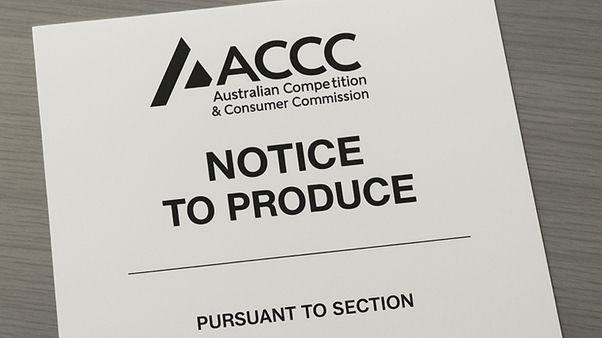- within Corporate/Commercial Law topic(s)
- in Africa
As a franchisor, receiving a formal Notice to Produce from the Australian Competition and Consumer Commission (ACCC) is a wake-up call you can't ignore. This isn't a courtesy letter, it's a compulsory demand for documents under section 155 of the Competition and Consumer Act. It signals the ACCC suspects a breach, often triggered by:
- Franchisee complaints
- Alleged non-compliance with the Franchising Code of Conduct
- Concerns over misleading conduct or disclosure failures
The response window is tight, and mishandling it can escalate to severe penalties, reputational damage, or worse. Here's how one franchisor turned a daunting ACCC investigation into an opportunity, and what you can take away from it.

As a franchisor, receiving a formal
Notice to Produce from the Australian Competition and Consumer
Commission (ACCC) is a wake-up call you can't
ignore.
The High-Stakes Reality
A Notice to Produce under section 155 of the Competition and Consumer Act doesn't arrive with advance warning. For one franchisor client, it landed during peak business hours, triggered by franchisee complaints about disclosure practices.
The clock started: 21 days to respond.
The Natural Instinct (That Kills Franchises)
When scrutiny strikes, franchisors default to damage control:
- Hire the most aggressive legal defense
- Adopting a defensive stance
- Saying as little as possible
This approach often backfires. Regulators like the ACCC don't respond well to stonewalling. It raises red flags and can intensify scrutiny.
The Strategic Pivot That Won
Instead of fighting, we took a strategic approach:
Run Toward the Truth
We launched a forensic audit of:
- Franchisee disclosure documents
- Marketing representations
- operational compliance
- Franchisee feedback channels
Gaps were identified. Not catastrophic, but significant.
Open the Books, Own the Gaps
Instead of selective disclosure, we presented a comprehensive picture:
- Areas of strong compliance
- Process weaknesses identified
- Immediate remediation steps
Build the Bridge, Not the Wall
Our ACCC engagement strategy:
- Preemptive documentation
- Transparent communication
- Demonstrated commitment to franchisee success
We engaged with the ACCC transparently, providing thorough and respectful responses. No posturing. No withholding.
This wasn't about avoiding accountability, it was about demonstrating a commitment to compliance and improvement.
What Emerged From Crisis
The result? Instead of crippling multi million dollar penalties, the franchisor received a small penalty of $24,000, a fraction of the potential cost.
More importantly, the process strengthened operations, elevated trust and increased risk awareness.
The Hard Truth for Franchisors
Small operational gaps + franchisee frustration = regulatory escalation
It's rarely one catastrophic error. It's a pattern of small oversights that compound into costly investigations.
Key Takeaways for Franchisors
This case highlights a critical truth: small operational issues can snowball into major regulatory problems, especially when franchisee dissatisfaction fuels complaints. To stay ahead:
✓ Regular disclosure audits (annually at a minimum)
✓ Franchisee satisfaction tracking
✓ Compliance culture training
✓ Legal systems review annually
✓ Proactive stakeholder engagement
The Ultimate Test
If an ACCC Notice arrived tomorrow, could your franchise demonstrate:
- Bulletproof disclosure processes?
- Happy, supported franchisees?
- Systems that prove compliance intent?
The Bottom Line
In franchising, proactive compliance isn't just cost-effective, it's essential for protecting your brand and avoiding the headlines. Invest in robust systems, foster strong franchisee relationships, and stay vigilant. The cost of prevention is always lower than the price of a crisis.
In franchising, your biggest threat isn't the regulator. It's the gap between your systems and your responsibilities.
P.S. The best franchise lawyers don't just defend, they prevent. Have you reviewed your disclosure documentation recently?
The content of this article is intended to provide a general guide to the subject matter. Specialist advice should be sought about your specific circumstances.
[View Source]

